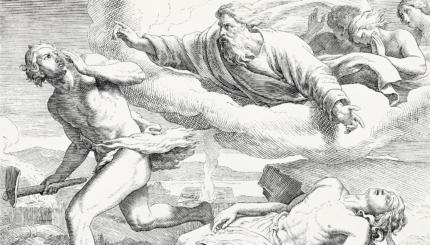The schlemiel is the guy who can’t help but screw things up. The ancestor of Seinfeld‘s Kramer, of Curb Your Enthusiam‘s Larry David, the schlemiel can’t stop from getting involved and, by being such a first-class schnook, cracking us up. Below are some classic schlemiel jokes:
Two Brothers
Once upon a time there were two brothers, Zelig and Leo. Zelig was a clever and alert young fellow, but Leo was a dolt — a first class schnook [Yiddish for simpleton]! Zelig, as might be expected, was welcomed wherever he went. He could tell witty stories and fascinating parables with intelligence and high humor. But poor Leo was never invited anywhere, for obvious reasons.
Now the boys’ mother was very unhappy about Leo’s plight, so she pleaded with Zelig to teach him how to become popular.
“Tell him some of the riddles, the stories and funny anecdotes you know so well. Teach him something, so that people will at least listen to him and maybe even pay him a compliment.”
With your help, My Jewish Learning can provide endless opportunities for learning, connection and discovery.
“All right, Mama, I’ll teach him,” sighed Zelig. So he took his brother aside and said, “Listen to me carefully, Leo. I am going to teach you a riddle. Tomorrow night at the meeting house you are to stand up and say ‘What am I?’ Some will answer ‘You are a fool!’ Others will reply ‘You are an idiot!’ To each one you are to answer ‘Wrong — guess again!’ Finally, when they have all given up, you are to answer the riddle by saying ‘I am hungry!’ Isn’t that clever, Leo?”
“Wonderful! Wonderful!” enthused Leo, doubling up with laughter.
All that day and the next he practiced the riddle, rehearsing every word Zelig had taught him. In the evening he went to the meeting house which was packed with the townspeople. He stood up and called loudly for silence. When the hubbub subsided, he shouted, “A riddle! What am I?”
As Zelig had foretold, everybody laughed. “A fool!” cried the tailor.
“Wrong! Guess again!” answered Leo gleefully.
“An idiot!” yelled the grocer.
“Wrong! Guess again!”
“All right, we give up,” they acknowledged. “Tell us, what are you?”
“Let’s eat!” hollered Leo proudly.
The Weary Traveler
A farmer was driving along the road one torrid summer day when he came upon an undersized old peddler with a heavy load of merchandise on his back. The poor little man appeared to be utterly exhausted as he trudged on.
The kindhearted farmer pulled his horse to a halt and offered the weary traveler a ride to the city.
They had been riding together for several minutes when the farmer noticed that his new companion was still holding the heavy burden on his back.
“My friend,” he said, “why not set your pack down in the wagon and make yourself comfortable?”
“Sir, you are a kind man and I don’t want to take advantage of your goodness,” answered the humble peddler. “It is enough that you are taking me to the city, and for that I thank you — but you don’t have to carry my pack too!”
Remember Your Name!
Seymour Kaplan, a pants-maker in New York, saved up enough money to justify a visit to the town of his birth in Russia. Having no passport, and ignorant of the procedure necessary to obtain one, he bought a passport for $15 from a local ganeff [Yiddish for thief]who specialized in such matters.
“All you need to remember is that your name is now Isaac Leibovitch,” cautioned the thief. “Just forget your own name and you won’t get into trouble.”
Seymour repeated the new name over and over again, committing it to memory so that he would not be found out. When he arrived at the Russian border, his passport was taken from him and the imperious customs official examined the picture on the document and then scrutinized Seymour’s face. There was a slight resemblance, but the officer wanted to make sure. He snapped several questions at the trembling little man who was beginning to sweat. Finally he asked, “What is your name?”
By this time, Seymour was so flustered and frightened that his mind was a blank. “My name — my name is — well, I–I…”
“Come, come!” rapped out the official curtly. “Surely you know your own name!”
“Look, mister,” he pleaded, “call me anything you want, but for Heaven’s sake, don’t call me Seymour Kaplan!”
The Clandestine Roommate
A salesman who was traveling to Petrograd was unable to continue his journey because of a severe snowstorm. The stationmaster told him that the trains would surely be running again at six o’clock the next morning, as the tracks would be cleared by that hour. The traveler had no alternative but to go to the local hotel.
By the time he arrived at the small-town hostelry all the rooms had been taken by the other passengers of the delayed train. However the desk clerk was a kindly soul who could not bear to put a weary stranger out in such a blizzard, and he hit upon an idea.
“Listen, my friend, all of the rooms here have a single bed each, so I can’t very well ask the occupants to put you up for the night. But there is one room here with two beds in it.”
“Thank God!” breathed the salesman. “I was afraid I might have to sleep out in the cold tonight.”
“Wait a minute, I must tell you something,” said the clerk hurriedly. “The guest in that room is a general in the czar’s army. But I’ll ask him if he will share his room with you.”
“Don’t bother,” sighed the other resignedly. “A general would never share his room with a Jew.” He thought about it for a moment and then his face brightened. “Look, I have an idea!” he said excitedly. “Maybe I can sleep in that extra bed after all. It is very late now, so the general must be fast asleep. Tomorrow I must rise early to catch the six o’clock train. At that hour of the morning he’ll still be sound asleep, and he’ll never know that I was in the other bed. Just be sure to wake me up on time.”
The hotel clerk agreed. Quietly the traveler tiptoed into the room of the czarist officer, and without a sound — almost afraid to breathe — the intruder undressed and went to sleep. In the morning the clerk awakened the general’s clandestine roommate at the appointed hour.
But in the predawn darkness the Jewish guest unwittingly donned the general’s uniform and hurried off to meet his train. On the way, he could not help but notice that everyone he met bowed and greeted him in a most respectful manner.
“How do they know that I shared the same room with a general?” he wondered.
He met a captain and then a major, and both saluted him smartly. At the ticket office the agent handed him a first-class ticket and assigned him to a private compartment.
“How is it that a Jew is treated so magnificently?” he asked himself, bewildered by the unaccustomed courtesy.
Inside the compartment he speculated on the probability that his single night’s association with a great czarist officer might have given him a kind of aristocratic aura — one of reflected glory. He stood before a mirror and stared at his reflection and examined his features for any possible change in his appearance, and as he did, a look of utter shock spread over his face as he recognized the general’s uniform.
“Oy vay!” he groaned. “That schlemiel of a desk clerk! I ask him to wake me up and instead he wakes up the general. Now, how will I ever catch this six o’clock train when I’m still sleeping back at the hotel?”
Reprinted with permission from the Encyclopedia of Jewish Humor, compiled and edited by Henry D. Spalding (Jonathan David Publishers).



